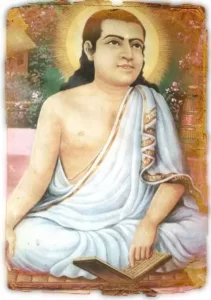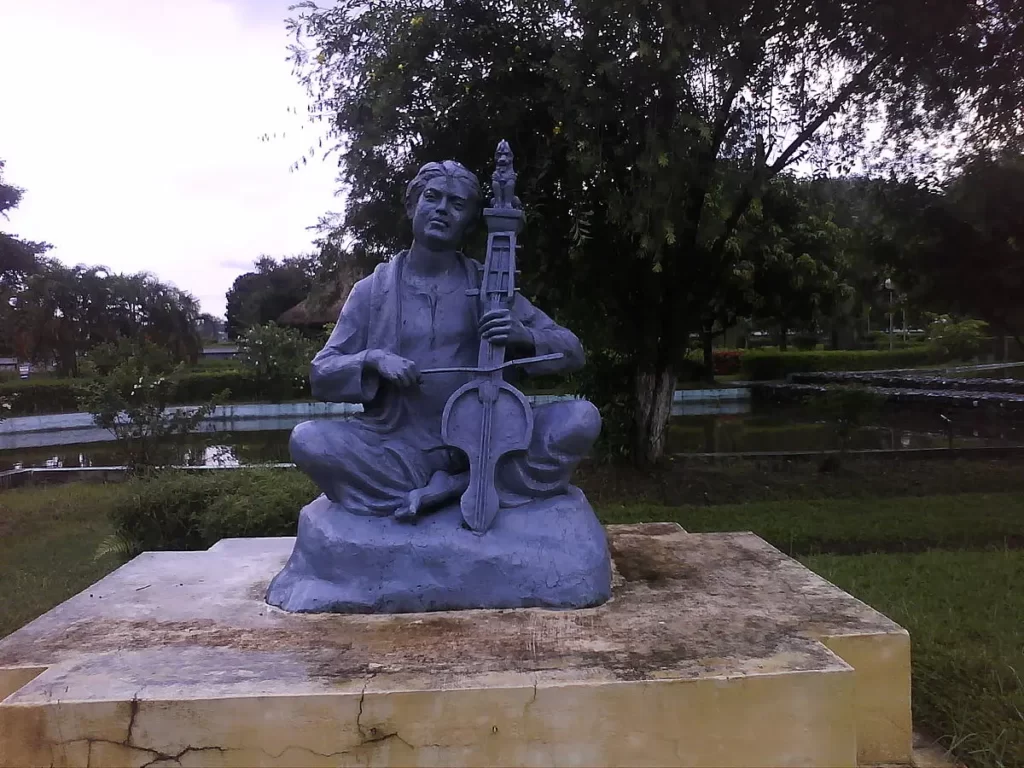 Srimanta Sankardev was a 15th–16th century Assamese polymath: a saint-scholar, poet, playwright, dancer, actor, musician, artist social-religious reformer and a figure of importance in the cultural and religious history of Assam, India. This year, the birth anniversary of Srimanta Sankardev is October 15, 2021.
Srimanta Sankardev was a 15th–16th century Assamese polymath: a saint-scholar, poet, playwright, dancer, actor, musician, artist social-religious reformer and a figure of importance in the cultural and religious history of Assam, India. This year, the birth anniversary of Srimanta Sankardev is October 15, 2021.
Sankara up to his twelfth year led a very active life, giving himself to sports and play almost all the time. He was especially fond of hunting. He did not show any interest or inclination towards studies. Being a motherless child, he was totally pampered by everyone. The grandmother began worrying much about the future prospects of the grandson. One day she admonished him telling that if he did not study and learn, he would bring only infamy to the family – and discredit to his glorious ancestors, who were all very learned almost like the Brahmin Pundits. As her anguish found its expression in tears while she was talking over to him thus, it brought out a great change in his heart.
Sankara joined a Tol (a private school) being conducted by a Brahmin Pundit by name Mahendra Kandali. He showed quick grasp and remarkable talents in his studies. He started composing beautiful poetry, which amazed his teacher. A higher destiny seemed to have taken the young Sankara in its hold, to guide and lead him for a divine purpose.
One miraculous event took place at that time after which he began to be called Sankara Deva. It was one Ekadasi day. In the forenoon when the school had mid-day break and while all the children left for their homes, Sankara stayed on the veranda and went to sleep. It was blazing hot. The teacher chanced to come back there on some work. Lo! what does he find? A huge cobra was holding its hood on the head of the boy, shielding him from the burning rays of the sun. Seeing this, the teacher realised that Sankara was not an ordinary child but a divine being. From that time onwards he began calling him Sankara Deva.
Sankara Deva completed his studies and became a fully fledged scholar. He learnt yoga also and became an adept yogi. The grandmother and the father felt very happy at Sankara’s accomplishments in scholarship.
At the age of 23, Sankara was married to at girl by name Suryabati. The grandmother and the father both passed away a little after this marriage. Suryabati did not live long: after giving birth to a daughter, she died in child-birth. A deep sense of detachment set over Sankara. He took earnestly to philosophical pursuits. but at the same time looking after his motherless daughter with all care and love. When his daughter came of age, he got. her married.
By this time, Sankara had attracted many spiritual aspirants as his disciples, among whom were also his own former teacher Mahendra Kandali and also his family priest. He set out with all of them, about 17 in number on a pilgrimage of the whole of Northern India up to Badarikasram in the North and Dwaraka in the West.‘ Wherever he visited, his profound scholarship amazed the pundits there, with whom he used to hold philosophical discussions. His pilgrimage lasted for full 12 years. By the time he returned to his native place, Sankara was a more mature, a fully blossomed and enlightened soul.
The Vaishnava Sampradaya (Vaisnavite lineages) at the various places he visited, based on pure love, made a great impact on his heart. He saw his mission and goal clearly now. Lord Krishna, the Supreme Godhead, and devotion to Him, took total possession or his mind and heart. Eka Sarana, surrender unto Him alone, became his sole faith and conviction. He started composing hymns, songs and dramas based on Krishna-Lore, which became very popular among people, and drawing many disciples and votaries to the Vaisnaiva faith which he set upon propagating.
He was offered at about this time the hereditary chieftainship of the Bhuyans, but he declined this, saying that he had decided to devote his life to God alone and would not like to get involved in temporal rulership and entanglements.
At this time, a Brahmin Pundit of Tirhut, named Jagdish Misra, used to do the Bhagavata recital in the Jagannath Temple at Puri. He got a dream wherein Lord Jagannatha appeared to him and said “Go to Kamrup and read out and explain to Sankara Deva the deeper meaning and import of the Bhagavata”.
The Pundit set out to Kamrup. sought out Sankara Deva and communicated his dream to him. Sankara Deva was also thirsting to have a clearer understanding of the spiritual import, and significance of the Bhagavata Purana and was looking for some eminent person to enlighten him in this. Lord Himself had sent the person whom he was seeking out. The Bhagavata reading was completed, the Pundit explaining all things most clearly and lucidly and revealing newer truths. Sankara Deva felt uplifted into new vistas of the spirit. Strangely, no sooner the recital was over, the Bhagavata Pundit died indicating as if the purpose of his life was fulfilled.
Sankara undertook a pilgrimage again, and at the same time preaching the Vaishnava theology.
“Absolute surrender to Sri Krishna and recourse to his Name as the only social, religious and spiritual ideal for all…”
His preaching of the new creed and his vehement criticism of the prevailing religious practices then, earned him many enemies. The latter were envious
at the growing popularity of Sankara and at the increasing numbers of people becoming his disciples. Sankara, to avoid the unsavoury environment. shifted to another place Dhuyahat which is also located in his native District only. It was in this place that Sankara met Madhava. who was destined to become the greatest disciple and the most redoubtable exponent of the tenets of his master. There is an interesting anecdote which brought these two together.
Madhava was an adept in Tantrik lore. Once when his mother fell seriously ill, he made a vow that if she recovers, he would immolate a goat before the Goddess. His mother did recover. In order to fulfil his pledge, he asked his brother-in-law Gayapani to buy and fetch a goat for the sacrifice. Gayapani who had a little earlier only been initiated into the Eka Sarana cult of Sankara, argued with him against the sacrifice, and took Madhava along with him to Sankara’s place. Sankara and Madhava argued for a long while on the merits of their own respective beliefs. Madhava brought in scriptural evidences in support of the principle of attachment to and involvement with the world, and Sankara, in support of detachment to the, world. The discussion was quite prolonged and it was nearly sunset time. Sankara sang the following sloka from Bhagavata, deeply lost in emotion.
“As the branches, leaves and foliage of a tree are nourished by pouring water only at the root of the tree, as the limbs of the body are nourished by putting food only in the stomach, so also all the gods and goddesses are propitiated only by the worship of Sri Krishna …
Madhava was touched deeply by this citation and bent his head in reverent acknowledgement of the purity and inviolability of Sankara’s creed and accepted him as his Master.
The Ahom king of the place at that time was a very whimsical person. One day he caught up the fancy of ordering his people to go elephant-catching. He made them erect a hard fence-work of wooden Palisades and said if anyone is not able to hold on to the Palisades and if the elephants break through from there, those people will be beheaded. Sankara and his relatives including his son-in-law, and Madhava etc., were stationed at one position. The trapped elephants broke through that phalanx and Sankara and his group were, therefore, ordered to be beheaded. Sankara, however, along with a few of the people, managed. to escape away, but not all of them. Sankara’s son-in-law, Hari, was beheaded. Madhava being an ascetic, was thrown into prison and was spared being beheaded. Sankara was disgusted with the Ahom ruler and with the place. He, along with some of his followers, left for Barpeta in the District of Kamroop, then under the Koch Kings of Kooch Behar. He felt secure here and settled down. Madhava also, who was released after an year from the jail, joined him. Here, Sankara preached his religion with perfect freedom. The greatest of the religious works of Sankara and Madhava were also produced here. The creed of Vaishnavism was consolidated, he having won the esteem and veneration of the king of the territory.
In the year 1569, Sankara Deva left his mortal coil to merge himself in the Supreme Being of his love and devotion, by yogic stilling of his breath. Prior to this, he nominated Madhava to succeed to his peetham (seat), and accordingly, Madhava carried on the mission of the Master after his leaving the mortal coil (samadhi).

Source
Image Source
![]()

